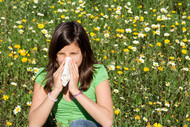Rhodiola Rosea Supplements and Spring Allergies
22nd Apr 2019
April showers bring, well, for many people, April showers bring the sniffles and sneezes in May. And we are sorry to be the bearer of bad news, but this year’s allergy season could be pretty bad.
Spring brings about blooming flowers and budding trees and if you are one of the millions of people with seasonal allergies, it also means congestion, sneezing, a runny nose and other bothersome symptoms. It is enough to make you feel miserable and dream about artificial turf and plastic flowers.
More than 20 million Americans are diagnosed with hay fever every year. The onset of spring brings an increase of pollen from flowers, grasses and trees, which trigger the unfortunate symptoms. Ameriden, your source for Rhodiola Rosea supplements, offers tips that will help you stay sneeze and sniffle-free this spring.
Clean, Clean, Clean
With spring allergies comes ongoing spring cleaning. It is a good idea to vacuum at least once a day if possible and mop the floors in the kitchen often. Use disinfecting wipes on any items you take out of the house, like your purse, gym bag and smartphone.
Wash your bedding often to keep allergens from accumulating.
Don’t forget to give Fido a bath and to throw his dog bed in the washing machine.
Wash Up
One of the best ways to reduce your allergy symptoms is by keeping pollen out of your house. Now, there are several ways you can do this.
The first thing you want to do is wash your hands and face every time you come in from outside. It is also a good idea to remove your shoes upon entering your home. In fact, have everyone who comes into your house take their shoes off and leave them outside.
On high-pollen days, you will want to remove your clothing when you get home and dress in something free from pollen. Before you go to bed at night, shower and shampoo your hair to help keep pollen out of your pillows and sheets.
Keep Flowers Outside
It might be mighty tempting to pick some spring flowers, place them in a vase and set them on the dining room table. However, don’t bring flowers inside if you are prone to allergies. If you desire flowers on your table, your best bet is to go plastic.
Plan Ahead
If you are wanting to go outside and get some exercise or fresh air, check pollen counts first. On days that have high pollen counts, it makes better sense to hold off on that bike ride or hike for another day.
Also, pollen counts are highest in the mornings between 5 and 10, so avoid morning jogs and other outdoor activities. Pollen is also quite bad on windy days.
The best time to go outside is after a rainstorm as this is when pollen counts will be at the lowest.
Exercise
The last thing you want to do when your nose is running and your eyes are itching is to workout. But research has shown that moderate exercise can result in substantial allergy relief.
If pollen counts are high, forget the bike ride and do your workout indoors.
Dietary Changes
Your diet plays a huge role in your overall health. It contributes to your energy levels, mood, skin appearance and weight balance. It also plays a role in how your body deals with allergies.
That said, it might be a good idea to maintain a healthy diet at all times, but especially during the allergy season.
Drink Water
Drinking plenty of water sounds simple enough. But you would be surprised by the number of people who don’t stay hydrated enough. Do your body a favor and stay hydrated.
Limit Your Yard Duties
We know that it is your turn to mow the lawn and trim the hedges, but you might want to leave it to someone else. If you have allergies, it might be best to delegate your outdoor chores to someone who won’t sneeze all over the place.
Dress Smart
Wear a hat with a wide brim and a pair of sunglasses to reduce the amount of pollen that will get into your eyes and settle in your hair.
Check out the supplements offered by Ameriden and stay sneeze and sniffle-free following these tips.


